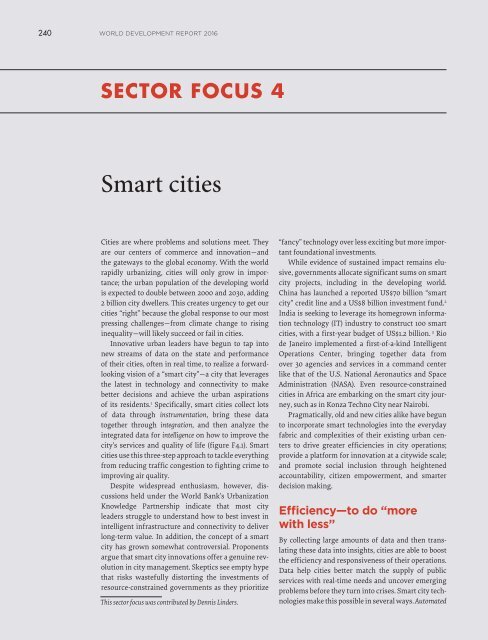Authorized Authorized
eERqs
eERqs
Create successful ePaper yourself
Turn your PDF publications into a flip-book with our unique Google optimized e-Paper software.
240<br />
WORLD DEVELOPMENT REPORT 2016<br />
SECTOR FOCUS 4<br />
Smart cities<br />
Cities are where problems and solutions meet. They<br />
are our centers of commerce and innovation—and<br />
the gateways to the global economy. With the world<br />
rapidly urbanizing, cities will only grow in importance;<br />
the urban population of the developing world<br />
is expected to double between 2000 and 2030, adding<br />
2 billion city dwellers. This creates urgency to get our<br />
cities “right” because the global response to our most<br />
pressing challenges—from climate change to rising<br />
inequality—will likely succeed or fail in cities.<br />
Innovative urban leaders have begun to tap into<br />
new streams of data on the state and performance<br />
of their cities, often in real time, to realize a forwardlooking<br />
vision of a “smart city”—a city that leverages<br />
the latest in technology and connectivity to make<br />
better decisions and achieve the urban aspirations<br />
of its residents. 1 Specifically, smart cities collect lots<br />
of data through instrumentation, bring these data<br />
together through integration, and then analyze the<br />
integrated data for intelligence on how to improve the<br />
city’s services and quality of life (figure F4.1). Smart<br />
cities use this three-step approach to tackle everything<br />
from reducing traffic congestion to fighting crime to<br />
improving air quality.<br />
Despite widespread enthusiasm, however, discussions<br />
held under the World Bank’s Urbanization<br />
Knowledge Partnership indicate that most city<br />
leaders struggle to understand how to best invest in<br />
intelligent infrastructure and connectivity to deliver<br />
long-term value. In addition, the concept of a smart<br />
city has grown somewhat controversial. Proponents<br />
argue that smart city innovations offer a genuine revolution<br />
in city management. Skeptics see empty hype<br />
that risks wastefully distorting the investments of<br />
resource-constrained governments as they prioritize<br />
This sector focus was contributed by Dennis Linders.<br />
“fancy” technology over less exciting but more important<br />
foundational investments.<br />
While evidence of sustained impact remains elusive,<br />
governments allocate significant sums on smart<br />
city projects, including in the developing world.<br />
China has launched a reported US$70 billion “smart<br />
city” credit line and a US$8 billion investment fund. 2<br />
India is seeking to leverage its homegrown information<br />
technology (IT) industry to construct 100 smart<br />
cities, with a first-year budget of US$1.2 billion. 3 Rio<br />
de Janeiro implemented a first-of-a-kind Intelligent<br />
Operations Center, bringing together data from<br />
over 30 agencies and services in a command center<br />
like that of the U.S. National Aeronautics and Space<br />
Administration (NASA). Even resource-constrained<br />
cities in Africa are embarking on the smart city journey,<br />
such as in Konza Techno City near Nairobi.<br />
Pragmatically, old and new cities alike have begun<br />
to incorporate smart technologies into the everyday<br />
fabric and complexities of their existing urban centers<br />
to drive greater efficiencies in city operations;<br />
provide a platform for innovation at a citywide scale;<br />
and promote social inclusion through heightened<br />
accountability, citizen empowerment, and smarter<br />
decision making.<br />
Efficiency—to do “more<br />
with less”<br />
By collecting large amounts of data and then translating<br />
these data into insights, cities are able to boost<br />
the efficiency and responsiveness of their operations.<br />
Data help cities better match the supply of public<br />
services with real-time needs and uncover emerging<br />
problems before they turn into crises. Smart city technologies<br />
make this possible in several ways. Automated


